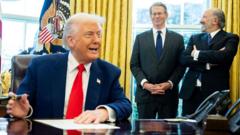In a surprising change of course, President Trump has announced a 90-day suspension of increased tariffs for several nations while imposing steeper tariffs on imports from China, igniting further trade confrontations and causing market fluctuations.
Trump Revises Tariff Strategy Amid Trade Tensions with China

Trump Revises Tariff Strategy Amid Trade Tensions with China
A significant shift occurs in U.S. trade policy as President Trump pauses higher tariffs for most countries but intensifies measures against China.
In a bold shift in U.S. trade policy, President Donald Trump has revealed a 90-day pause on higher tariffs affecting numerous countries, while simultaneously escalating the trade conflict with China. This announcement comes just hours after the implementation of new tariffs on around 60 trading partners, prompting market turbulence that sparked substantial financial losses globally.
Instead of the increased tariffs for countries such as the European Union and Vietnam, Trump revealed a universal "lowered reciprocal tariff of 10%" as discussions continue. However, he has directed a sharp increase in tariffs on Chinese goods, raising them to an aggressive 125%. This move follows China's retaliation, as they imposed an 84% tariff on U.S. imports in response. The friction escalated just after Trump had enacted the largest import tax regime seen in decades, which instituted varying tariffs between 11% to over 100% on what he described as "worst offenders."
Major market reactions ensued following these announcements. As the U.S. Treasury saw interest rates rise to their highest since February, the stock market suffered losses, raising concerns about potential recessionary pressures. Despite the panic, when Trump declared the 90-day pause for non-retaliating countries, shares surged significantly, with the S&P 500 climbing by nearly 9.5%.
In his statement on Truth Social, Trump emphasized that the pause signifies a diplomatic opening for countries that did not retaliate, warning of doubled tariffs for those who did, particularly targeting China. "The days of ripping off the U.S.A. and other Countries, is no longer sustainable or acceptable," he stated, expressing optimism about negotiating a resolution with Chinese President Xi Jinping.
While U.S. Treasury Secretary Scott Bessent maintained that policy changes were not influenced by market dynamics, critics such as Senator Chuck Schumer labeled it a retreat from Trump's earlier aggressive stance. Amid these developments, a spokesperson from the UK government affirmed a stance against a trade war, signaling the complicated web of international relations under the current tariff scenario.
The trade standoff, rooted originally in the tariffs announced last week, has created a significant strain between the world's largest economies. China's officials responded decisively, stating their opposition to "bullying practices" and reaffirming their commitment to counteractions if provoked further. The stakes are high, with projections from the World Trade Organization suggesting a potential 80% decline in trade between the U.S. and China.
As the ramifications of these tariff decisions unfold, the current global environment remains precarious, with the possibility of further escalation raising alarms within various sectors. Notably, previously announced tariffs on cars and steel are unaffected by Trump's new adjustments, leaving broader implications for international trade yet to be fully realized.





















